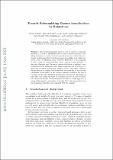Towards reformulating Essence specifications for robustness
View/
Date
25/10/2021Author
Grant ID
EP/K015745/1
EP/V027182/1
RGF\EA\181005
Metadata
Show full item recordAbstract
The Essence language allows a user to specify a constraint problem at a level of abstraction above that at which constraint modelling decisions are made. Essence specifications are refined into constraint models using the Conjure automated modelling tool, which employs a suite of refinement rules. However, Essence is a rich language in which there are many equivalent ways to specify a given problem. A user may therefore omit the use of domain attributes or abstract types, resulting in fewer refinement rules being applicable and therefore a reduced set of output models from which to select. This paper addresses the problem of recovering this information automatically to increase the robustness of the quality of the output constraint models in the face of variation in the input Essence specification. We present reformulation rules that can change the type of a decision variable or add attributes that shrink its domain. We demonstrate the efficacy of this approach in terms of the quantity and quality of models Conjure can produce from the transformed specification compared with the original.
Citation
Akgün , Ö , Frisch , A M , Gent , I P , Jefferson , C , Miguel , I , Nightingale , P & Salamon , A Z 2021 , Towards reformulating Essence specifications for robustness . in ModRef 2021 - The 20th workshop on Constraint Modelling and Reformulation (ModRef) . The 20th workshop on Constraint Modelling and Reformulation (ModRef) , 25/10/21 . < https://arxiv.org/abs/2111.00821 > workshop
Publication
ModRef 2021 - The 20th workshop on Constraint Modelling and Reformulation (ModRef)
Type
Conference item
Description
Funding: This research was supported by the UK EPSRC grants EP/K015745/1 and EP/V027182/1. Chris Jefferson is a University Research Fellow funded by the Royal SocietyCollections
Items in the St Andrews Research Repository are protected by copyright, with all rights reserved, unless otherwise indicated.

